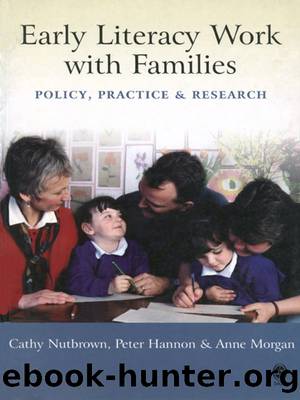Early Literacy Work with Families by Nutbrown Cathy;Hannon Peter;Morgan Anne; & Peter Hannon & Anne Morgan

Author:Nutbrown, Cathy;Hannon, Peter;Morgan, Anne; & Peter Hannon & Anne Morgan
Language: eng
Format: epub
ISBN: 1210803
Publisher: SAGE Publications, Limited
Published: 2005-09-18T00:00:00+00:00
Summary discussion
We have used the notes of one teacher to illustrate one familyâs involvement in a family literacy programme. This has conveyed the work with the family over time and gives a sense of development and of the relationships between the teacher and the family. We can see how over time, one teacher planned for continuity and progression, using the ORIM framework to prepare interesting and relevant activities on all four strands of literacy development in the framework and which addressed four aspects of parentâs roles. The accounts of work with Robbie and his family show how much went on and it becomes clear how much literacy is going on in the family.
This familyâs continuing commitment to family literacy is evident, as is their willingness to participate in literacy activities between visits (in spite of other pressures such as time constraints due to work). The family clearly valued the programme; this is evident in the way that postcards from the teacher were displayed and literacy resources made in earlier visits were saved in a scrapbook. Importandy, the accounts show how Robbieâs motherâs confidence appeared to grow as she developed a positive working relationship with the teacher. It seems that she became increasingly comfortable with her role as her own childâs teacher; over time she seemed more willing to give her opinion about the books and games the family borrowed.
Robbieâs literacy development over time is clear. Robbie seemed interested in books from the first visit, in which he asked many questions about the books. But other aspects of his literacy development can be seen, for example, at the beginning of the programme Robbie was not keen on drawing and writing (see visit 2 â week 3) or reading alphabet books (see visit 3 â week 11). By the end of the programme, however, he had come to enjoy both of these; in visit 10 (week 65) he was reported to be âreally interested in letters and numbersâ and clearly enjoyed writing on the T-shirt and decorating biscuits.
Using the ORIM framework, Robbieâs programme teacher worked with his family to plan and develop a family literacy programme which: built on what existed; developed from one visit to the next; created a relationship through which the mother developed her own role; and supported Robbieâs literacy development through a flexible programme of continuity and progression.
Download
This site does not store any files on its server. We only index and link to content provided by other sites. Please contact the content providers to delete copyright contents if any and email us, we'll remove relevant links or contents immediately.
The Art of Coaching Workbook by Elena Aguilar(50419)
Trainspotting by Irvine Welsh(21220)
Twilight of the Idols With the Antichrist and Ecce Homo by Friedrich Nietzsche(18388)
Fangirl by Rainbow Rowell(8889)
Periodization Training for Sports by Tudor Bompa(8004)
Change Your Questions, Change Your Life by Marilee Adams(7479)
This Is How You Lose Her by Junot Diaz(6569)
Asking the Right Questions: A Guide to Critical Thinking by M. Neil Browne & Stuart M. Keeley(5484)
Grit by Angela Duckworth(5375)
Red Sparrow by Jason Matthews(5277)
Paper Towns by Green John(4906)
Room 212 by Kate Stewart(4851)
Ken Follett - World without end by Ken Follett(4521)
Housekeeping by Marilynne Robinson(4152)
The Sports Rules Book by Human Kinetics(4148)
Double Down (Diary of a Wimpy Kid Book 11) by Jeff Kinney(4040)
Papillon (English) by Henri Charrière(4019)
The Motorcycle Diaries by Ernesto Che Guevara(3861)
Exercise Technique Manual for Resistance Training by National Strength & Conditioning Association(3855)
